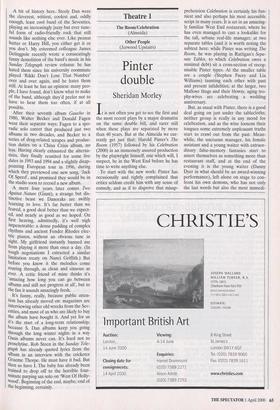Theatre 1
The Room/Celebration (Almeida)
Other People
(Jerwood Upstairs)
Pinter double
Sheridan Morley
It is not often you get to see the first and the most recent plays by a major dramatist on the same double bill, and rarer still when these plays are separated by more than 40 years. But at the Almeida we cur- rently get just that: Harold Pinter's The Room (1957) followed by his Celebration (2000) in an immensely assured production by the playwright himself, one which will, I suspect, be in the West End before he has time to write anything else.
To start with the new work: Pinter has occasionally and rightly complained that critics seldom credit him with any sense of comedy, and as if to disprove that misap- prehension Celebration is certainly his fun- niest and also perhaps his most accessible script in many years. It is set in an amazing- ly familiar West End restaurant, where he has even managed to cast a lookalike for the tall, urbane real-life manager; at two separate tables (and it is worth noting the subtext here: while Pinter was writing The Room, he was playing in Rattigan's Sepa- rate Tables, to which Celebration owes a minimal debt) sit a cross-section of recog- nisable Pinter types. At the smaller table are a couple (Stephen Pacey and Lia Williams) taunting each other with past and present infidelities; at the larger, two Mafioso thugs and their blowsy, aging tro- phy-wives are celebrating a wedding anniversary.
But, as usual with Pinter, there is a good deal going on just under the tablecloths; neither group is really in any mood for celebration, and as the wine loosens their tongues some extremely unpleasant truths start to crawl out from the past. Mean- while, the unctuous manager, his female assistant and a young waiter with extraor- dinary false-memory fantasies start to assert themselves as something more than restaurant staff, and at the end of the evening it is the young waiter (Danny Dyer in what should be an award-winning performance), left alone on stage to con- front his own demons, who has not only the last words but also the most immedi- ate claim to our ultimate attention.
Virtually all this wondrously versatile cast also appear in The Room, where to complete this Pinter circle they are joined by the actor who first discovered and directed the play back in the Fifties, Henry Woolf. What is intriguing here is the way that The Room not only signals and fore- shadows everything that we now mean by Pinteresque, but also the way that it has failed to date. Unlike, for instance, Look Back in Anger, first staged a year before The Room and now often looking very creaky indeed, the Pinter is made timeless by its signature minimalism, by its sense of unspoken menace and mystery, by its abso- lute refusal to play the game by any of the then current theatrical rules. The reason that Pinter's earliest critics (among them Noel Coward, who very quickly came around to him) found The Room so hard to take was largely that it made a then tradi- tionally lazy audience do at least some of the work to fathom the unfathomable.
Now the sinister landlord, the downtrod- den housewife and the two thuggish visitors seem like old friends rather than new threats; both these plays are about some of the same things — sexual jealousy, name- less terrors, violent men and women who have only their sex to define them. But where The Room is frequently vicious, Cel- ebration is something still more dangerous; the only visible knives here may be the ones on the elegantly laid tables, but peo- ple are also getting laid and knifed, only this time with a smile. It is the smile of the killer monsters and mobsters, but the shark still has shiny teeth, dear, and Pinter shows them pearly white.
At the handsomely refurbished Jerwood Upstairs of the Royal Court, Christopher Shinn's Other People is the story of half a dozen dysfunctional and disconnected mis- fits trying to work out the purpose of life and art in New York's East Village. So what, you hear me cry, as we have certainly been along these mean streets many times before; Shinn even has the gall to mount a brilliant attack on the inanity of Rent (with which I entirely agree), only he is unfortu- nately blaming that overpraised musical for doing precisely what he is also doing on a rather more slender budget, namely staging the lives of the dispossessed and the men- tally and morally inert in order to intrigue and titillate infinitely wealthier and better- organised middle-class theatregoers.
His whole script is a fragmented and fragmentary debate about the borderlines of art and reality; all his characters (a strip- per, a middle-aged malcontent, a born- again Christian coming off drugs and a video-packager who gets fired for praising films he hasn't even bothered to fast-for- ward) are so unhappy with their own reality that they all escape into some form of sexu- al or religious fantasy. But this is an uneasi- ly mid-Atlantic production by Dominic Cooke on Robert Hopkins's brilliant slid- ing set. It is, for instance, wildly unlikely
that a local London audience are going to understand a crucial last-act reference to Dick Clark, unless they happen to be unusually familiar with American televi- sion's New Year's Eve rituals.
For all that, a strong cast led by an erst- while National Theatre Peter Pan, Daniel Evans, does its best to only connect with an interesting new voice which is a world away from the harsher realities of the Mamet generation; Shinn is an eccentric and wil- fully edgy love child of Stephen Sondheim and Woody Allen.























































































 Previous page
Previous page